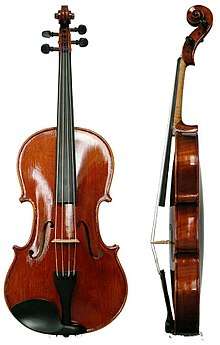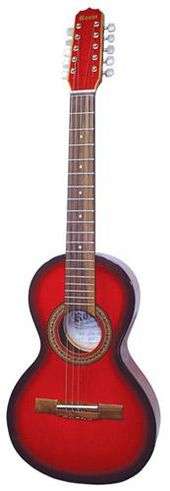viola
English

Etymology 1

From Italian viola, from Old Occitan viola (modern Occitan viula), from Medieval Latin vitula (“stringed instrument”). Compare viol.
Pronunciation
Noun
viola (plural violas)
- (music) A stringed instrument of the violin family, somewhat larger than a violin, played under the chin, and having a deeper tone.
- (music) An organ stop having a similar tone.
- (music) A 10-string steel-string acoustic guitar, used in Brazilian folk music.
Derived terms
Translations
|
|
- The translations below need to be checked and inserted above into the appropriate translation tables, removing any numbers. Numbers do not necessarily match those in definitions. See instructions at Wiktionary:Entry layout#Translations.
References
- Oxford Advanced Learner's Dictionary
- Cambridge Advanced Learner's Dictionary
- “American Heritage Dictionary”, in (Please provide the title of the work), accessed 28 November 2009, archived from the original on 31 December 2008
Etymology 2

Pronunciation
Noun
viola (plural violas)
Translations
References
- Compact Oxford English Dictionary
- “Collins English Dictionary”, in (Please provide the title of the work), accessed 28 November 2009, archived from the original on 18 February 2010
- “American Heritage Dictionary”, in (Please provide the title of the work), accessed 28 November 2009, archived from the original on 13 February 2010
Etymology 3
Interjection
viola
- Misconstruction of voila
- 2011, Hedge Funds for Dummies:
- [...] ; you fill out a form; you write your check; and viola! You're a mutual fund shareholder.
- 2011, Hedge Funds for Dummies:
References



Asturian
Catalan
Pronunciation
Derived terms
- viola alba (V. alba)
- viola boscana (V. sylvestris, now V. reichenbachiana)
- viola canina (V. canina)
- viola d'olor or viola vera (V. odorata)
Etymology 2
Uncertain origin, probably from Occitan viula, derivative of viular (“playing a string instrument” or “wind”)
Synonyms
- (violist): violista
Etymology 3
Etymology 4
Czech
Esperanto
Pronunciation
Audio (file)
Adjective
viola (accusative singular violan, plural violaj, accusative plural violajn)
- of or relating to the flower violet
- the color of such flowers, violet violet colour:
- Synonym: violkolora
Finnish
Declension
| Inflection of viola (Kotus type 12/kulkija, no gradation) | |||
|---|---|---|---|
| nominative | viola | violat | |
| genitive | violan | violoiden violoitten | |
| partitive | violaa | violoita | |
| illative | violaan | violoihin | |
| singular | plural | ||
| nominative | viola | violat | |
| accusative | nom. | viola | violat |
| gen. | violan | ||
| genitive | violan | violoiden violoitten violainrare | |
| partitive | violaa | violoita | |
| inessive | violassa | violoissa | |
| elative | violasta | violoista | |
| illative | violaan | violoihin | |
| adessive | violalla | violoilla | |
| ablative | violalta | violoilta | |
| allative | violalle | violoille | |
| essive | violana | violoina | |
| translative | violaksi | violoiksi | |
| instructive | — | violoin | |
| abessive | violatta | violoitta | |
| comitative | — | violoineen | |
Italian
Pronunciation
- IPA(key): /ˈvjɔ.la/
- Hyphenation: viò‧la
Noun
viola f (plural viole)
Derived terms
Etymology 2
Possibly from Old Occitan viola (modern Occitan viula), ultimately from Medieval Latin *vitula (“stringed instrument”).
Pronunciation
- IPA(key): /ˈvjɔ.la/
- Hyphenation: viò‧la
Derived terms
- viola da braccio
- viola da gamba
- viola del pensiero
Etymology 3
Pronunciation
- IPA(key): /ˈvi.o.la/
- Hyphenation: vì‧o‧la
Verb
viola
- inflection of violare:
- third-person singular present indicative
- second-person singular imperative
See also
| Colors in Italian · colori (layout · text) | ||||
|---|---|---|---|---|
| bianco | grigio | nero | ||
| rosso ; cremisi | arancione ; marrone | giallo ; crema | ||
| verde chiaro; limetta | verde | verde acqua, acquamarina; verde menta; verde menta scuro | ||
| ciano, azzurro, celeste ; blu petrolio, foglia di tè | azzurro; celeste; celeste scuro | blu | ||
| violetto ; indaco | magenta ; viola | rosa; fucsia; porpora | ||
Latin
Etymology
Related to Ancient Greek ἴον (íon, “violet”) (from ϝίον). Probably from a pre-I.E. Mediterranean language. See also Middle Persian wnpšk'.
Pronunciation
- (Classical) IPA(key): /ˈwi.o.la/, [ˈwi.ɔ.ɫa]
Inflection
First declension.
| Case | Singular | Plural |
|---|---|---|
| Nominative | viola | violae |
| Genitive | violae | violārum |
| Dative | violae | violīs |
| Accusative | violam | violās |
| Ablative | violā | violīs |
| Vocative | viola | violae |
Descendants
References
- viola in Charlton T. Lewis and Charles Short (1879) A Latin Dictionary, Oxford: Clarendon Press
- viola in Charlton T. Lewis (1891) An Elementary Latin Dictionary, New York: Harper & Brothers
- viola in Charles du Fresne du Cange’s Glossarium Mediæ et Infimæ Latinitatis (augmented edition, 1883–1887)
Portuguese
Etymology 1
From Old Portuguese viola, from Old Occitan viola, from Medieval Latin vitula, from Vitula, Roman goddess of joy and victory.
Noun
viola f (plural violas)
- (music) viola (a bowed instrument larger than a violin)
- (music) viol (a bowed instrument of the violin family held between the legs)
- (music) viola; viola caipira (10-string acoustic guitar used in Brazilian folk music)
- (music, Brazil, loosely or affectionate) acoustic guitar
- guitarfish (any of the rays in the Rhinobatidae family)
Synonyms
- (viol): viola da gamba
- (viola caipira): viola caipira
- (acoustic guitar): violão, guitarra
- (guitarfish): cação-viola, raia-viola, arraia-viola
Derived terms
- violinha (diminutive)
- adeus viola
- cação-viola
- enfiar a viola no saco
- meter a viola no saco
- raia-viola
- viola bastarda
- viola braguesa
- viola caipira
- viola de amor
- viola de arame
- viola de braço
- viola francesa
- violão
- viola pomposa
- viola sertaneja
- violeiro
- violista
Related terms
Etymology 2
Romanian
Pronunciation
- IPA(key): /vjoˈla/
Verb
a viola (third-person singular present violează, past participle violat) 1st conj.
Conjugation
| infinitive | a viola | ||||||
|---|---|---|---|---|---|---|---|
| gerund | violând | ||||||
| past participle | violat | ||||||
| number | singular | plural | |||||
| person | 1st person | 2nd person | 3rd person | 1st person | 2nd person | 3rd person | |
| indicative | eu | tu | el/ea | noi | voi | ei/ele | |
| present | violez | violezi | violează | violăm | violați | violează | |
| imperfect | violam | violai | viola | violam | violați | violau | |
| simple perfect | violai | violași | violă | violarăm | violarăți | violară | |
| pluperfect | violasem | violaseși | violase | violaserăm | violaserăți | violaseră | |
| subjunctive | eu | tu | el/ea | noi | voi | ei/ele | |
| present | să violez | să violezi | să violeze | să violăm | să violați | să violeze | |
| imperative | — | tu | — | — | voi | — | |
| affirmative | violează | violați | |||||
| negative | nu viola | nu violați | |||||